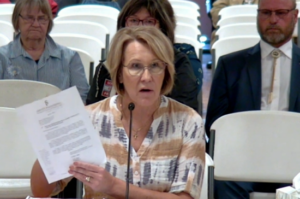Summit pipeline hearings wrap up with more landowner complaints

Julia Stamer, who lives near Hazelton, North Dakota, points to a map showing the Summit Carbon Solutions route through Emmons County and near her home while testifying before the Public Service Commission in Linton on June 4, 2024. (Image from Public Service Commission video)
Julia Stamer listed off the reasons the North Dakota Public Service Commission denied Summit Carbon Solutions a pipeline permit last year and said, “none of those things have changed.”
Stamer testified Tuesday in Linton, the site of the last Public Service Commission hearing on the reconsideration of Summit’s carbon capture pipeline permit application.
The public hearing was dominated by landowners and neighbors of the proposed pipeline concerned about the safety of the pipeline and frustrated with dealing with Iowa-based Summit.
There were supporters of the project. State Sen. Terry Wanzek, R-Jamestown, saying he was testifying as a farmer, said he feared for the future of the state’s ethanol industry without the project.
The $8 billion project would capture carbon emissions from 57 ethanol plants in five states. The CO2 would be piped to an underground storage site northwest of Bismarck.
The three-member PSC last year denied Summit’s pipeline in part because it didn’t feel it adequately addressed the concerns of landowners and should explore a different route around Bismarck.
Stamer, who lives near Hazelton in Emmons County, does not feel Summit has made a sufficient effort in her case. She testified that she has asked Summit for a reroute, including by certified mail, but has not gotten a response until 48 hours before the hearing, a response that she described as inadequate.
“It changes nothing,” she said.
She also said Summit has not inquired to her about cultural resources, another concern of the PSC, that she said she testified about and displayed in a 2023 PSC hearing.
“Summit has no regard for our cultural resources,” she said.
Stamer and other reiterated concerns about the potential for pipeline rupture that could endanger lives.
She said the higher pressure and volume than existing carbon pipelines makes it a “science experiment.”
“It’s like comparing a slight breeze to a tornado. Both move air, but one is helpful and the other one is a catastrophe,” Stamer said.

Stephanie Doolittle is an Emmons County landowner who benefited from a reroute of the pipeline but credited that to the PSC singling out her family in its 2023 ruling. Even though the pipeline is off her property, it is nearby.
“The safety concerns remain the same,” she said.
While Summit says it has obtained voluntary easements for more than 80% of the 353 miles proposed pipeline miles in North Dakota, Doolittle and others questioned how voluntary those agreements really were.
She said landowners experienced “emotional and financial exhaustion” from being “bullied by billionaires.”
She said her family incurred $15,000 in legal fees.
Wanzek testified that the potential for ethanol plants to lower their carbon intensity score through capture and sequestration would open up the potential to tap into the sustainable aviation fuel market that represents a huge opportunity for agriculture.
While he agreed that safety needs to be a priority “but we take calculated risks every day,” he said.
State Sen. Jeff Magrum, R-Hazelton, later testified that North Dakota corn growers should not give up their competitive advantage by letting ethanol plants from other states send their carbon emissions to North Dakota.
The Summit pipeline would connect to plants in Iowa, Nebraska, Minnesota and South Dakota. Only one North Dakota plant is part of the project, Tharaldson Ethanol at Casselton.
Two other North Dakota ethanol plants, Red Trail Energy at Richardton and Blue Flint Ethanol at Underwood, already are using carbon sequestration, benefiting from being near areas suitable for underground storage.

“Why would they be working against those two plants?” Magrum asked of North Dakota corn growers.
Another testifier in favor of the pipeline was Morton County Emergency Manager Patrick Martin.
Martin countered testimony from Emmons County residents that Summit had been misleading about the risks of the pipeline.
Asked why he didn’t testify at an earlier hearing in the Morton County seat of Mandan, Martin said he was not aware of the hearing and Summit officials asked him after that hearing to testify in Linton.
Administrative Law Judge Hope Hogan, who oversaw the proceeding, set a July 8 deadline for attorneys in the case to submit written closing arguments.
In addition to needing a pipeline route permit from the PSC, Summit needs an underground storage permit that would come from the North Dakota Industrial Commission. Hearings are set for June 11-12 in that case.
GET THE MORNING HEADLINES DELIVERED TO YOUR INBOX SUPPORT NEWS YOU TRUST.
The post Summit pipeline hearings wrap up with more landowner complaints appeared first on North Dakota Monitor.
